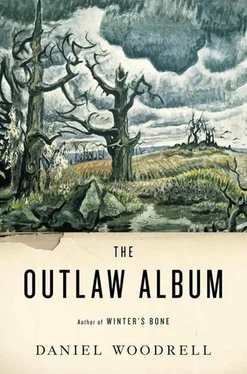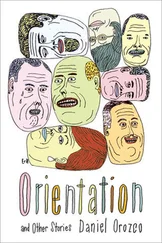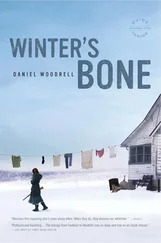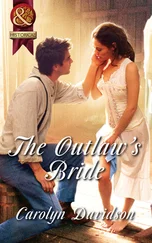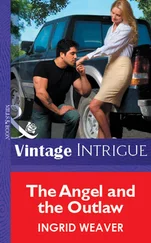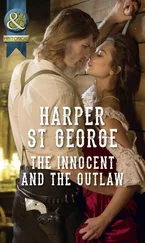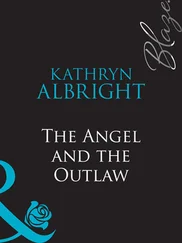So it’s written down for an accident by the law, and the Ballou kids from that home-sawn house on the Hill come along fatherless into the war years, years that were hard on everybody, those wrinkling years of rubber rations, gas rations, meat rations, and unlimited worry, worry, every day the worry and the wrinkling and another supper leached from the same ham bone and more navy beans. See them waiting for dark before touring the square during the holiday season, heavy wet misting clouds between the tall lamps and their feet, pausing before the keenly garish shop windows, dampening scarves molding to their heads, wearing the uncertain slanting gaze of children who’ve been scalded other times for acting too familiar. A damp virtuosity of misshapen reflections on the street, the windows, the eyeglasses of the few walkers passing by, and two girls noting to each other the presents they most favored from shops they’d never go inside.
My father, drinking the whiskey he loved in the shadowed garage, with meddlers out of sight, fall 1992: “We each of us get dealt a lot of cards by our old ones, son, but you don’t want to play them all.”
The Hill as it was is vanished now, finished off by high heels and humiliated scolds, flattened to nothing and the scraps carted away in 1956. The sound of her high heels clicking on sidewalk cement brought water to the mouths of men within ear of her sashay, moist and listening as she came along so avid and fluid, with fluctuating mounds, the clicks entering their heads with the rhythm of dreams. A blooming of taffeta and a sweet woozy smell. Her voice was rich and round and rolled on and on, seducing with each spin, and the voice gave her a fresh name—Dyna Flo. A smitten car dealer used her in local radio spots, and she said the tagline so it held within it the promise of everything craved: “It’s the Dyna Flo that makes it magic, folks. Come on out to Yount’s Buick’n see for yourselves.” Mr. Yount fell her way, his wallet held open and his mind helplessly made up. He swung by on Saturday nights with bottles of hooch and sporting friends, and the friends soon fell her way, too, and dripped dollar bills to her floor. Dyna Flo Ballou, her first name lost just as her father’s had been, walked tall and flush and brought stray bits of finery to the Hill: curtains of bright yellow, brittle champagne glasses, expensive dresses from St. Louis in the wrong color for my skin, honey, that were soon worn by young girls mopping the floors of town.
My oldest living relative, during a warm winter, while her husband cleaned fish near Mammoth Spring: “She was drop-dead gorgeous. That gal got prettier every time I saw her, and she stopped traffic the first time I saw her. And, lordy, that voice—that Dyna Flo voice! No, no, she wasn’t the kind of beauty you could ever miss—had eyes ’bout as blue as yours, Danny. We used to run into her sometimes when you were tiny. She always wanted to touch you. Touch your nose, tickle your cheek. Just touch you.”
A schedule was arranged between the men with money, and Dyna Flo laughed low and golden from her porch steps until heard by wives who couldn’t stand the sound nor the fact of her. The men were shamed but would not give her up, and marriages split in spots that never healed. Humiliated, the wives gathered uncles, brothers, friends from church with white robes and sticks, and during a rainy spell went to Dyna Flo’s house, kicked the door aside, and threw everything she had into the yard-mud. Get out of town, tonight, or the same train’ll hit you that hit your daddy. A week later every household on the Hill received a letter from the city, telling them to vacate the premises while water lines and sewers were put in and the streets were paved. We’ll let you know when you can come back.
Mr. Tom Finney: “Most likely St. Louis. That’s what I heard. Folks was rough on colored people then, and black was the main one of them colors.”
Mr. Ronnie Thigpen, Egypt Grove, 1994: “I went back by once the sheriff come along for a look. There was a bunch of two-by-fours that was splintered a little bit and had bloody places on ’em. Five or six, I guess. I seen the sheriff sort of kick those two-by-fours away from the tracks, down into the creek there. That’s when he said, ‘Looks to me like ol’ Blue jumped in front of a timber train. Amen.’”
Mrs. E. H. Chambliss, accosted and held by the wrist, outside the Front Street Church of Christ in 1998, a month after her husband’s death: “They was all brought together by love, Danny. The love of that horse. Your granddaddy doted on that thing, him’n Blue, then somethin’ soured and Blue got drunk’n died. That horse was magnificent, hear? Beautiful to see, he was. Would’ve won any race he could’ve been got to—just that special. He was just so special.”
My oldest living relative, sitting in a shaded parlor, upon reading my notes and turning over the last page, folded her old hands and closed her eyes: “There never was a horse. The rest is true.”
I. Coleman Younger, The Last Is Gone—1916
The river takes it from almost anywhere, trims branches with floating logs, smoothes edges on miles of rocky bottom and sandy bank, distorts the shape of the former tree by sucking it down at a hundred eddies of swirling murk, then spewing it back to the polishing touches of the everlasting current. Sometimes the river leaves the driftwood on a sandbar’s lip, or jabbed into a dike—a present for me. I transport such gifts to my workshop. There I take my Barlow and ease it against the wood, scraping gently at the layers, taking substance away to reduce the piece to the design I see in it. I labor on it for days, and I have been laboring thusly for years, but humility commands an admission—many times the river’s hand carved more truly, and I bring no improvement.
On the day that I learned Coleman Younger had passed on to his stoked reward I searched for a special piece, and the river, now an occasional ally, sharing with me both muddy history and uncertain age, obliged.
I enlisted a hangdog grandson to assist me. His name was probably Karl, although he looked a lot like Kurt, especially as regards his subdued aspect. They are both like their father; blond-headed Dutch boys with that sort of Germanness that tape-measures all it meets and argues the logic of all that is not numbers. Not what I’d ever wanted to be, or been, or even tolerated.
The rarity of that clean-shaven oak length being so handy was not lost on me. Luck is a goddess, but if you bet on her she will desert you faster than a Frenchman. But that day I did not hope for luck, so there it was, a four-foot section of river-planed oak. There is never much oak, and this oak was on the first sand spit below the bend in the Missouri River. Karl or Kurt and I never had to wet a boot. We dragged a trail through the packed sand, he being too young to lift it alone and me too close to being young again, I feared. We lugged it along the path through the trees, up the glistening mudbank by the railroad tracks, then across the rails and back to town.
We pulled the wood onto our shoulders when we came to Main Street, me in the lead, my hunched form not much taller than the boy’s. Our boots slipped on the cobblestones, from brick to brick, not slickly enough to trip us, but enough to lend a whoosh to our passing. There were louts on horseback, the shod animals sparking with each step, to avoid. Hemsath the egg man left his wagon in our path with one of his girlish brood sitting on the seat, using a switch to tease the mule about the eyes. A mule will not tolerate such levity long, so we stepped quick and put the pair behind us.
As we passed the Fremont Room of the Saint Charles Hotel, nearly home, a voice called out to me.
Читать дальше
